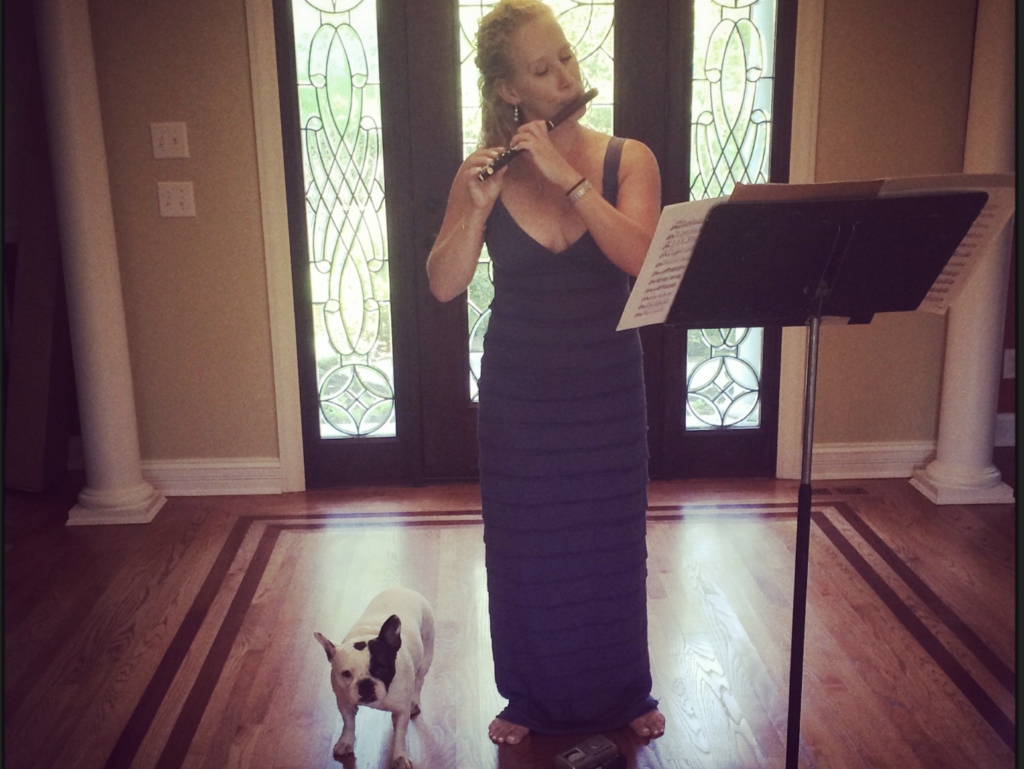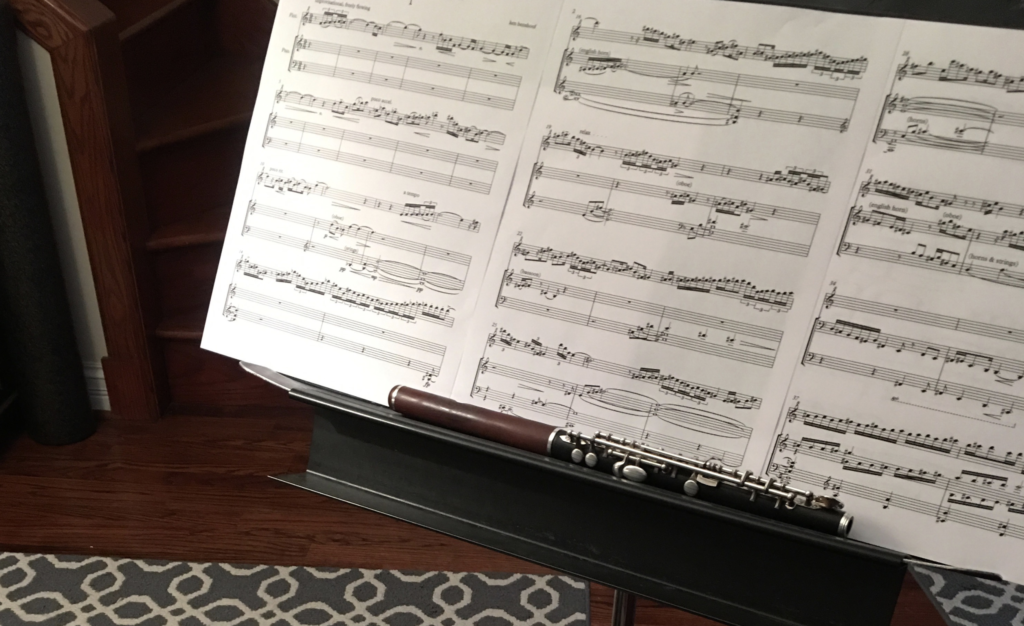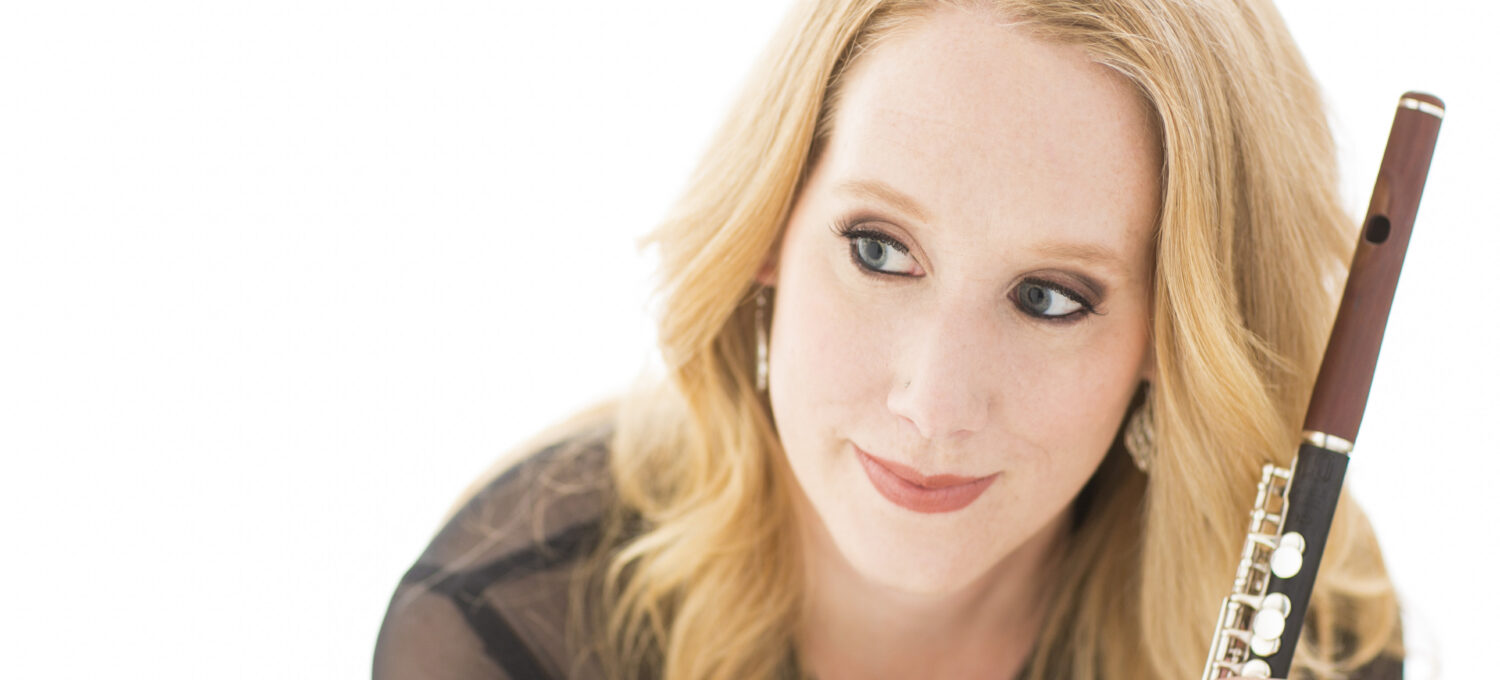KH: I remember the first time I heard you play with the CSO. I happened to be in Chicago and my flight was cancelled until the next day so a friend and I decided at the last minute to walk in and see if we could catch Swan Lake, done with shadow puppets. It was incredible. I remember thinking about how delicate and beautiful your playing was. When did you first realize that you had a love for the piccolo? How do you approach the piccolo in comparison to the flute? What are your sound concepts or influences?
JG: You are so sweet!! Thank you for that nice compliment! The piccolo and I did not have a “love at first sight” relationship. I think like many flute performance majors, I was just that- a FLUTE major. I had my sights set on a principal flute position! I was very fortunate to have weekly orchestral excerpt classes during my undergraduate degree and some of those weeks were piccolo weeks. I think if I didn’t have that class, I am not sure how much piccolo I would have played in my undergraduate degree. I had a used plastic Gemeinhardt 4P and that little thing had a very sweet sound and had no trouble popping out the high B naturals in Lt. Kije! But, when did I realize I had a love for the piccolo? This a very hard thing to pin down for me. I was fortunate to start working in orchestras pretty quickly after school. My first job was 2nd flute in the Wheeling Symphony and then my next job was Principal Flute in the Fort Wayne Philharmonic. I finally won that principal job! Well, I think I realized pretty quickly that position wasn’t for me so during the summer months when I was off from the orchestra I found myself practicing my piccolo. At this point I had my first wooden piccolo, a Brannen Brothers Piccolo. After a few years in Fort Wayne, I won a position as Assistant Principal/2nd flute in the Louisville Orchestra. I enjoy playing 2nd flute very much and was very happy in that job. During this time the position for Piccolo in the Chicago Symphony Orchestra was open again and my Piccolo colleague in the LO urged me to try. So, I did. To my surprise, I made the finals. It is a long story, but eventually I got the job. I really think I have truly fallen in love with the instrument and what it can add to the orchestra while being a member of the CSO. I don’t try to play my piccolo in a different way than my flute. I think both instruments should have a singing quality to their approach. My approach to playing the piccolo in the orchestra is kind of an extension of the principal flute at times, other times a second flute one octave above, and other times a true soloist! We might sit around a lot, but the piccolo chair is never boring!
KH: You hold a premier piccolo position in one of the top orchestras in the United States. Has this always been a career goal? What advice do you have for aspiring players?
JG: I don’t think I ever had my sights set on any one particular orchestra job, I knew that I wanted to play the flute and be able to earn a living doing just that. The road to an orchestra job is not easy, not going to lie! One thing that has always kept me going is my love of playing and playing in the orchestra. I have had many moments of doubt and almost throwing in the towel, but I cannot imagine doing anything else. If I could talk to my younger self I might tell her to be patient, more kind to herself, not to compare herself to others too much, and don’t listen to the self-doubt. We all have different paths in our careers and life and sometimes that is hard to understand or accept.

KH: I am sure a major orchestra gig is taxing as well as your many featured solo engagements. What kind of regular practice routine do you keep? Are there any particular etudes or exercises that you recommend or use as your go to more than anything else?
JG: The orchestra schedule can be very grueling and sometimes difficult to find time for good practice sessions, especially trying to keep both flute and piccolo playing in tiptop shape. It might sound boring, but basic fundamentals are essential for good playing and physical health on the job! At the CSO, we are playing completely new programs every week and sometimes more than one program of music per week. Being in good playing shape is essential to be able to learn music quickly. Even though I don’t carry it around with me anymore, the Trevor Wye Tone book is forever imprinted on my brain! (This is for both flute and piccolo.) I usually have Paul Edmund-Davies 28 Practice Book, Nicola Mazzanti’s Piccolo Method book and Patricia Morris’s Piccolo study book in my bag. Other than that—scales and long tones.
KH: We are in uncharted waters as far as performing ensembles and venues being shut down due to the current pandemic. How do you stay motivated and positive? How are you dealing with the absence of the performances and audiences? What suggestions do you have for fellow musicians to help us connect to our music without the aspect of live performing?
JG: This has definitely been a very strange time. When everything first shut down, I flew to Austin, TX where my husband, Jonathan, teaches Clarinet at the University of Texas. I didn’t take much with me except the Mazzanti Method, Patricia Morris’s piccolo study book, Paul Edmund-Davies 28 day exercise book and the Telemann fantasies. I had no idea how long I would be there! (Well, a long time!) To be very honest, when our concerts were cancelled, I was upset but almost relieved that I had time to breath for what I thought would just be a week or two. When I arrived in Austin, Jonathan was starting to teach online upstairs, so I would just practice while he taught his lessons. For the first time in years, I could just practice without any goal in mind or concert deadline. I was enjoying searching through IMSLP and reading music for fun! Within the first couple of weeks Nicola started a Facebook group to practice the piccolo. This was one thing that gave me a little bit of structure and really helped with my motivation. I also enjoyed seeing musician friends from all over playing little recitals, giving talks, and enjoyed listening to interviews of musician friends.
Quickly realizing we might be in this situation for a while, I find it important not to put too much pressure on myself. Most days I make it a priority to get through all of my “must” practice things but, somedays I just play through whatever I feel like. With this in mind, it has been helpful for me to have a checklist of the things I want to accomplish for the day. This could be as simple as “play the flute today” or a very specific list of scales, long tones, etudes, and pieces to practice.
I know we all have seen lots of videos on the internet made by musicians all over the place! I have partnered with some colleagues at the CSO for a couple of projects. But, what has brought me the most joy have been little videos of whatever I am practicing that I send to my sister from time to time. We have always shared our love of music and this has been fun for me to have a reminder of the joy in music we shared when we were very young!
KH: Without thinking, can you name a handful of your favorite piccolo pieces from the orchestral or solo repertoire that are must-plays for piccolo players?

JG: Eeek- without thinking?? Shostakovich ANYTHING, Verdi operas, Rossini. I love it all! Solo rep- Ken Benshoof Spindrift.
KH: Finally, you and I are both dog lovers and have on countless occasions shared photos of our fur babies. I have to ask, how do your fur kids react to your piccolo? My pup, Jackson, loves it and falls asleep.
JG: Lol! Our three dogs are quite used to instruments playing in the house. Our black lab, Spencer, usually just lets out a gentle “harrummmphh” and then goes to sleep. Dolley, our 10-year-old french bulldog, sometimes will let out some little grumbles when the playing starts but will just give up and go to sleep. Murphy, our almost 2 year old frenchie, will sometimes sing along for quite a bit, almost matching pitches of long tones. But, most of the time he gives up and goes to his little bed. When Jonathan plays his clarinet, both frenchies will make a lot more noise!
KH: Well, Jenn, thank you so much for sharing your insight and taking the time to talk with me!
About Jennifer Gunn
Hailed for her “virtuosic poise” and as “a dazzling piccolo virtuoso”, Jennifer M Gunn was appointed to the position of Piccolo of the Chicago Symphony Orchestra by Maestro Daniel Barenboim in 2005. Since joining the CSO, she has been active in many areas of the organization including the MusicNow Series, the Civic Orchestra of Chicago, the Dream Out Loud Music Education Advocacy Campaign, the Once Upon a Symphony series, CSO Chamber series, and has accompanied Maestro Muti on multiple occasions to the Chicago Juvenile Centers.
Equally at home on the flute or the piccolo, Jennifer has been featured as a soloist with the orchestra on many occasions. She made her flute solo debut under the direction of Ludovic Morlot on the orchestra’s MusicNow series playing Shirish Korde’s Nesting Cranes in 2007. One year later she made her piccolo debut under the direction of Harry Bicket playing Vivaldi’s C Major Concerto RV443 on the CSO’s subscription series. Jennifer has also been featured as a flutist on Bach’s Brandeneburg Concerti with her CSO colleagues under the direction of both Nicholas Kraemer and Pinchas Zukerman. In March of 2019, Jennifer will be featured as piccolo soloist under the direction of Music Director Maestro Muti playing Vivaldi’s C major Concerto RV444 and also playing the CSO premiere of Ken Benshoof’s Concerto in Three Movements for Piccolo and Orchestra.
Jennifer has enjoyed many occasions to join musician colleagues from the Chicago area and around the world. In the chicagoland area, she has been a guest with the Bach Week, Dempster Pro Musica, Music of the Baroque, and the Civitas Ensemble. Outside of Chicago, Jennifer has enjoyed collaborating with musician friends at music festivals such as the Sunflower Music Festival in Topeka, KS, Buzzards Bay Music Festival in Marion, MA, Arizona Music Festival in Scottsdale, AZ, and the St. Barth’s Music Festival in St. Barthelemy, French West Indies. She can also be heard on recordings of music by composers Mason Bates, Anna Clyne, and Victoria Bond as well CSO orchestra recordings on the CSO Resound Label.
In demand as a clinician, Jennifer has taught masterclasses around the world including a regular summer class at Orford Musique in Canada, guest artist at the 2018 International Piccolo Festival in Grado, Italy. She is a frequent guest at University’s around the country teaching flute and piccolo masterclasses including classes at Carnegie Hall, Univeristy of Texas Butler school of Music, University of Illinois at Urbana-Champaign, University of Missouri- Kansas City, and Northwestern University. Jennifer has also been involved as an orchestral coach with the Civic Orchestra of Chicago, the National Youth Symphony (NYO), and the New World Symphony.
Jennifer has held previous orchestra positions including Assistant Principal Flute of the Louisville Orchestra, Principal Flute of the Fort Wayne Philharmonic, and Second Flute of the Wheeling Symphony. She holds a Bachelor of Music Degree from the Mary Pappert School of Music at Duquesne University (PA), where she studied with Robert Langevin and Rhian Kenny. She had additional studies at the University of Akron (OH) with George Pope and Mary Kay Robinson.
Jennifer is married to Jonathan Gunn, Professor of Clarinet at University of Texas Butler School of Music.

